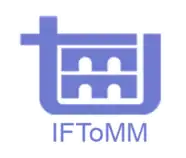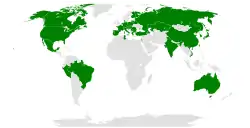International Federation for the Promotion of Mechanism and Machine Science
International Federation for the Promotion of Mechanism and Machine Science (IFToMM) is an organization that supports international exchange of researchers and engineers from the wide range of discipline related to Mechanical Engineering.
 English language logo of the IFToMM | |
 | |
| Abbreviation | IFToMM |
|---|---|
| Formation | September 29, 1969 |
| Founders | I. Artobolevski, E. Crossley, and others. |
| Founded at | Zakopane |
| Type | NGO |
| Legal status | International Federation |
| Purpose | Professional Cooperation |
Region served | World |
Membership | 45 member organizations |
Secretary General | T. Zielinska |
President | M. Ceccarelli |
Vice-President | T. Huang (acting) |
| Website | iftomm |
Mission
To promote research and development in the field of Machines and Mechanisms by theoretical and experimental methods, along with their practical application.
History
It was on September 29, 1969m at the Second World Congress on Theory of Mechanisms and Machines which took place in Zakopane (Poland), that two scientists, Ivan Artobolevski (USSR) and Erskine Crossley (USA), proposed to establish an International Federation of scientists and engineers to facilitate worldwide collaboration.[1] [2] Representatives of 13 countries signed the foundation act and the International Federation for the Theory of Machines (IFToMM) came into existence.[3] The initial Member Organizations were represented by:
- Academician Ivan I. Artobolevski (USSR),
- Prof. Erskine F.R. Crossley (USA),
- Prof. Michael S. Konstantinov (Bulgaria),
- Dr. Werner Thomas (GFR),
- Prof. B.M. Belgaumkar (India),
- Prof. Kenneth H. Hunt (Australia),
- Prof. J. Oderfeld (Poland),
- Prof. Jack Phillips (Australia),
- Prof. George Rusanov (Bulgaria),
- Prof. Wolfgang Rössner (GDR),
- Prof. Zènò Terplàn (Hungary),
- Prof. Jammi S. Rao (India),
- Prof. Giovanni Bianchi (Italy),
- Prof. Adam Morecki (Poland),
- Nicolae I. Manolescu (Romania),
- Leonard Maunder (UK),
- Douglas Muster (USA),
- Ilic Branisky (Yugoslavia).
Given the expansion of the topics within the IFToMM umbrella,[4] [5] [6] [7] in 1999, the Executive Council decided to recognize the changing role of the organization in international collaboration and approved a new name: "The International Federation for the Promotion of Mechanism and Machine Science". However, the Executive Council considered that the abbreviation IFToMM was already widely used, and therefore suggested to keep it (along with the logo) as a short version of the organization's name. [8]
Officers, Presidents, and General Secretaries
IFToMM officers are the Chairs of IFToMM Member Organizations, the Chairs of Permanent Commissions and Technical Committees, as well as the members of the Executive Council. A complete historical list of IFToMM officers was published in the Proceedings of the Second International Symposium on History of Machines and Mechanisms HMM2004.[9]
The Presidents were:
- Ivan I. Artobolevskii (USSR),
- Leonard Maunder (United Kingdom),
- Bernard Roth (USA),
- Giovanni Bianchi (Italy),
- Adam Morecki (Poland),
- Jorge Angeles (Canada),
- Kenneth J. Waldron (USA),
- Marco Ceccarelli (Italy),
- Yoshihiko Nakamura (Japan),
- Marco Ceccarelli (Italy) (repeated), and
- Andrés Kecskeméthy (Germany) (starting January 2020).
The Secretaries General were:
- M.S. Konstantinov (Bulgaria),
- Emil Stanchev (Bulgaria),
- Adam Morecki (Poland),
- Elizabeth Filemon (Hungary),
- Ladislav Půst (Czechoslovakia),
- Tatu Leinonen (Finland),
- Marco Ceccarelli (Italy),
- Teresa Zielinska (Poland) (two terms), and
- Erwin Christian Lovasz (Romania) (starting January 2020).
Meetings
- IFToMM General Assembly: every 4 years
- Executive Council Meeting: an annual meeting of the members of Executive Council
- IFToMM World Congress: every four years
List of all IFToMM World congresses:
| World Congress | Host Institution(s) | Host Country (City) | Dates | No. of papers | No. of countries represented |
|---|---|---|---|---|---|
| 1st IFToMM World Congress | Bulgaria (Varna) | September 27–30, 1965 | 64 (4 volumes) | 14 | |
| 2nd IFToMM World Congress | Poland (Zakopane) | September 23–27, 1969 | 66 (3 volumes) | 12 | |
| 3rd IFToMM World Congress | Yugoslavia (Kupari) | September 1971 | 198 (8 volumes) | 22 | |
| 4th IFToMM World Congress | United Kingdom (Newcastle upon Tyne) | September 8–12, 1975 | 230 (5 volumes) | 28 | |
| 5th IFToMM World Congress | Canada (Montreal) | July 8–13, 1979 | 350 (2 volumes) | 34 | |
| 6th IFToMM World Congress | India (New Delhi) | December 15–20, 1983 | 338 (2 volumes) | 35 | |
| 7th IFToMM World Congress | Spain (Seville) | September 17–22, 1987 | 417 (3 volumes) | 38 | |
| 8th IFToMM World Congress | Czechoslovakia (Prague) | August 26–31, 1991 | 359 (6 volumes) | 40 | |
| 9th IFToMM World Congress | Italy (Milan) | August 29 – September 5, 1995 | 665 (3 volumes) | 51 | |
| 10th IFToMM World Congress | Finland (Oulu) | June 20–24, 1999 | 628 (7 volumes) | 50 | |
| 11th IFToMM World Congress | China (Tianjin) | April 1–4, 2004 [a] | 491 (5 volumes) | 43 | |
| 12th IFToMM World Congress | France (Besançon) | June 17–20, 2007 | 535 (digital proceedings) | 52 | |
| 13th IFToMM World Congress | Universidad de Guanajuato | Mexico (Guanajuato) | June 19–25, 2011 | 309 (digital proceedings) | 43 |
| 14th IFToMM World Congress | National Taiwan University[10][11] | Taiwan (Taipei) | October 25–30, 2015 | 559 (digital proceedings) | 47 |
| 15th IFToMM World Congress | AGH University of Science and Technology | Poland (Kraków) | June 30–July 4, 2019[12][13] | 457 (digital proceedings) | 66 |
| 16th IFToMM World Congress | Japanese council of IFToMM | Tokyo (Japan) | Sept. 10–15 (or Nov. 5–10), 2023 [b] |
Notes
- a Postponed from August 18–21, 2003, due to SARS.
- b Decided at the IFToMM General Assembly on July 3, 2019 (Krakow, Poland).
Members
Membership in IFToMM is not individual. Instead, it is by Member Organization (MO) which are akin to national or territorial organizations. A full list of Member Organizations available on the IFToMM web site. Each MO has its own individual or group membership rules.
As of the 2015 General Assembly held in Taipei (Taiwan), IFToMM had 47 MOs. In 2018, the membership went down to 45 MOs.
| Current MOs in IFToMM |
|---|
| Former MOs in IFToMM |
|---|
Organizational structure
The organizational structure of IFToMM includes following bodies
General Assembly
The General Assembly is the supreme body of the Federation that determines policy. It is composed of the Chief Delegates of IFToMM Members and members of the Executive Council.
Executive Council
The Executive Council is responsible for managing the affairs of the Federation between the sessions of the General Assembly. The Executive Council includes the President, Vice-President, Secretary-General, Treasurer, and six ordinary members.
Commissions and Committees
There are four Permanent Commissions (PCs) and 14 Technical Committees (TCs) established under IFToMM supervision. Each Permanent Commission and Technical Committee is composed of a Chairperson, appointed by the Executive Council, and a Secretary and members, nominated by the Chairperson and appointed by the Executive Council. The general goals for the work of the Commissions and Committees are aimed at promoting their fields of interest by attracting researchers and practitioners, including young individuals. The four PCs are:
- Permanent Commission for Communications, Publications and Archiving
- Permanent Commission for Education
- Permanent Commission for the History of Mechanism and Machine Science
- Permanent Commission for the Standardization of Terminology
While the 14 TCs are:
- Technical Committee for Biomechanical Engineering
- Technical Committee for Computational Kinematics
- Technical Committee for Gearing and Transmissions
- Technical Committee for Linkages and Mechanical Controls
- Technical Committee for Micromachines
- Technical Committee for Multi-body Dynamics
- Technical Committee for Reliability
- Technical Committee for Robotics and Mechatronics
- Technical Committee for Rotordynamics
- Technical Committee for Sustainable Energy Systems
- Technical Committee for Transportation Machinery
- Technical Committee for Tribology
- Technical Committee for Vibrations
See also
- Theory of Mechanisms and Machines
- Canadian Committee for the Theory of Machines and Mechanisms
References
- Koetsier, T. (2000). "Mechanism and Machine Science: its history and its identity". Proc. of HMM2000 - the First IFToMM International Symposium on History of Machines and Mechanisms. Kluwer (Dordrecht). pp. 5–24.
- Angeles, J.; Bianchi, G.; Bessonov, A. P.; Mauder, L.; Morecki, A.; Roth, B. (2004). "A History of IFToMM". (Chapter 2 in) Proceedings of HMM2004- the Second IFToMM International Symposium on History of Machines and Mechanisms. Kluwer (Dordrecht). pp. 25–125.
- Crossley, F. R. E. (1991). "The early days of IFToMM". Proceedings of 8th IFToMM World Congress. Prague. pp. 4–9.
- Morecki, A. (1995). "Past present and future of IFToMM". Mechanism and Machine Theory. 30: 1–9.
- Morecki, A. (1999). "International friendly thinkers organization (who like) Machines and Mechanisms (IFToMM) – Where are we going?". Proceedings of the 10th IFToMM World Congress,. Oulu, Finland: IFToMM.
- Crossley, F. R. E. (1970). "The International Federation for the Theory of Machines and Mechanisms". Journal of Mechanisms. 5: 133–145.
- Ceccarelli, M. (2011). "Activity and Trends in MMS from IFToMM community". Role of MMS and IFToMM in Technology Development. Series on Machines and Machine Science. 1. Springer (Dordrecht). pp. 3–24. doi:10.1007/978-94-007-1300-0_1.
- "History of IFToMM". iftomm.org. Retrieved 2012-08-16.
- Angeles, J.; Bianchi, G.; Bessonov, A. P.; Mauder, L.; Morecki, A.; Roth, B. (2004). "A History of IFToMM". (Chapter 2 in) Proceedings of HMM2004- the Second IFToMM International Symposium on History of Machines and Mechanisms. Kluwer (Dordrecht). pp. 25–125.
- "2015 International Federation for the Promotion of Mechanism and Machine Science (IFToMM) World Congress". The China Post. July 5, 2011. Retrieved 1 September 2012.
- "NTU gears up for 2015 mechanism and machine congress". Taiwan Today. July 5, 2011. Archived from the original on 3 March 2016. Retrieved 1 September 2012.
- "15th IFToMM World Congress". 15th IFToMM World Congress (in Polish). Retrieved 2018-02-27.
- IFToMM (August 26, 2017). "IFToMM World Congress". iftomm.net. Retrieved 2018-02-27.